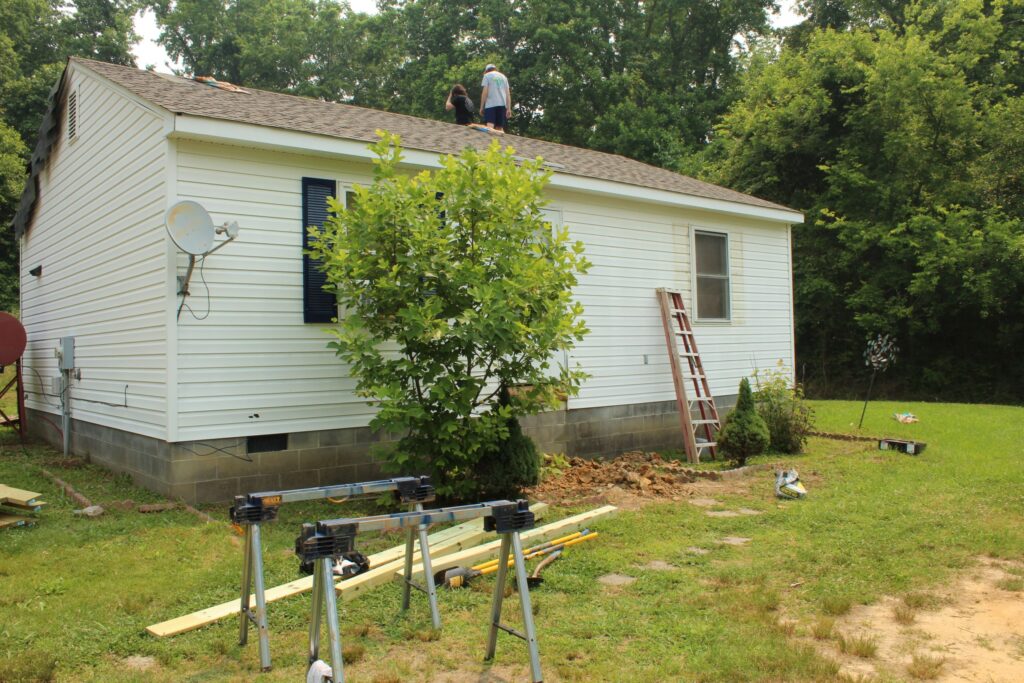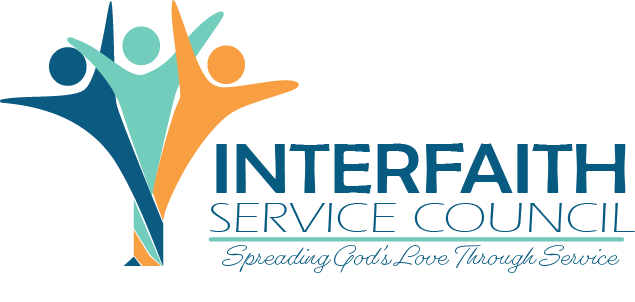Interfaith Service Council
Published March 2, 2025 in The House and Home Magazine
Author: Audrey T. Hingley
For volunteers at Interfaith Service Council, helping others is not just a credo but a way of life.
According to Edna Mason, who spent eight years as president of the nonprofit organization and has been with them since 2007, Interfaith began in 1982 when St. Francis Catholic Church in Kilmarnock sent a letter to area churches noting that individual churches were all dealing with community needs and suggesting that coordination of aid requests would be a positive thing. The result was a meeting where representatives from seven churches met and formed a group initially called Lancaster County Interfaith Social Action Council.
At the same time, the late Admiral “Duke” Bayne and the late Joe Currie were providing small home repairs free of charge for needy community members. Mason says by 1989, Bayne and Currie had joined with Interfaith to do practical work projects with Interfaith providing the funds. The group, which expanded to include services for people in Northumberland County, became Interfaith Service Council, with a mission to provide tangible support to people facing financial or physical challenges so they can safely remain in their homes. The organization’s motto: “Spreading God’s love through service.”
This week, David Lacy, the Ramp & Repair Division Lead reported that Interfaith volunteers completed two jobs, including a new roof in Lancaster and a wheelchair ramp in the Ocran area.
Today Interfaith Service Council provides basic home repairs, emergency financial assistance and household goods for people in need. They work with families who are living at or below 200 percent of the poverty level in Lancaster and Northumberland. By 1996, two different people who owned adjoining lots donated vacant land at 1086 Harris Road, and a warehouse and other structures were erected. The warehouse accepts donations of furniture and household goods from community members, businesses and churches for needy families at no cost to them.
Applicants for services or warehouse goods must live in Lancaster or Northumberland Counties, complete an application and provide income verification. Every Monday and Wednesday from 10 a.m. until 12 noon, the warehouse opens for qualified individuals to select free household items. Interfaith can pick up donated furniture or household items, but they do not deliver items. Clients must arrange for their own pickup. Approved clients can visit the warehouse three times per year; after that they must be rescreened to confirm continued eligibility.
"Several years ago, a friend brought a gentleman to the warehouse who needed an electric stove, and we happened to have one [at the time]. He said, 'I didn't even know about Interfaith, and now I have everything I need!' We also assist people who have had fires or have experienced some sort of natural disaster"
Edna Mason
Interfaith has three divisions: warehouse, emergency assistance and the Ramp and Repair Division. Other than a few grants over the years, as a 501© 3 nonprofit organization, Interfaith relies on tax-deductible donations. Group treasurer Christina Smith says Interfaith has endowment money, so donations go 100 percent to the community and people in need. There are no paid staff members; everyone is a volunteer.
The Ramp and Repair Division is headed by longtime volunteer David Lacy, who lives in King and Queen County.
Lacy, a semi-retired businessman, got involved with Interfaith in 1995 when he was living in Chesterfield County and attending Southside Church of the Nazarene. He also had a home in Callao at the time. He explains, “The youth pastor asked [youth group] parents if they knew of any mission we could do [with the youth group]. Through my home in Callao, I was put in touch with Mr. Currie, who was doing the same job I am doing now. In 1995, fifty middle-schoolers came [on that first trip]. We slept in tents in my yard in Callao in the summertime and worked on four job sites. We painted a house and put a roof on a house… just practical things to help people. It was a turning point for me and I’ve been doing it ever since.”

“In 2024, our division built sixteen new wheelchair ramps; twelve new sets of steps; did three floor repairs; ten new roofs; five exterior door replacements; five plumbing repairs; and five miscellaneous jobs, for a total of 59 total jobs completed at no expense to the homeowner,” Lacy says. “That’s a job completed every 6.2 days!”
David Lacy
He adds, “I have a [volunteer] crew of seven people that work almost every week. All the crew is retired except for one person. We would like volunteers for the division that live in the [coverage] area but for the present, all [volunteer workers] are from New Kent or Chesterfield.”
Home ramps can also be done for renters if the landlord approves the work. Referrals for home repair work and emergency assistance are handled by Christina Smith. Smith, who has served as Interfaith treasurer for 13 years, works at St. Andrews Presbyterian Church in Kilmarnock.
“A major issue is people needing help who won’t ask for help,” Smith admits. “Joe Currie had his finger on the community and knew who needed help. The older generation is less likely to ask for help. We are seeing people who grew up here, were educated here, but they may be just barely getting by [financially]. There are also limited housing options. The lowest rents [in this area] are about $1,200-$1,300 per month; bills have gone up. We have to help people pay bills, because there is nowhere for people to go.”
Volunteer Susan McKeown says in the early days of the organization, volunteers would cut, split and deliver wood to needy clients who used wood for heat. One of Interfaith’s newest volunteers, Marilyn Crenshaw, says she just likes to help people.
Smith notes, “What’s changed is people are now getting to know us, and we are seeing homeless situations here, which we didn’t see before the COVID-19 [pandemic]. Many of our clients are elderly, and we are also seeing transients, which is new for this area.”
“Some people in this area still don’t have running water,” she adds. “Or they may have an old septic system and an old well. A new well and septic can cost up to $25,000.”
McKeown says retiree volunteer Bernard Robinson can do shallow wells and some well repairs for Interfaith clients. Local businesses also help; for example, Lamberth Building Materials Inc. in White Stone gives a contractor discount to Interfaith for supplies they purchase for home repair projects. The all-volunteer labor is free.
Smith says requests for services come from a variety of places, including ministers, rehabilitation centers, doctor’s offices and social workers. When asked why she has stayed with Interfaith for so long, Smith says, “My kids would tell you I try to fix everything–but the people we are helping truly need our help.
In addition to free household goods at the warehouse, home repairs and emergency assistance, Interfaith has also bought glasses for clients and paid for car repairs. The group of volunteers is not large; in addition to Lacy’s Ramp and Repair Division, about ten other volunteers help screen people, sort warehouse donations or handle office tasks.
Smith says she would like to see more affordable housing in the area so people could have a better quality of life. Smith says Lacy has many heart-rending stories to share. One recent project illustrates Interfaith’s work: Interfaith helped a woman in Northumberland County who lived in a camper trailer without running water.
“She’s lived on her land for ten years and has septic but no water,” Lacy explains. “She saw us putting in a ramp [at a neighbor’s house] and [told us] she did not have any water. I told her, ‘We’re gonna’ pray you get water!’ Later another neighbor asked if she would like to hook into her well. Interfaith paid to have that water run to her house—just a pipe that runs to her house and spigots, but it cost $3,500 [to do that]. Now she has water.”
Lacy’s stories are numerous. He recalls, “I walked into a house and the floor in the living room had about a six-inch dip in it—if you jumped up and down on it, your foot would probably go through the floor, so they could not use the living room. It was the same in the bedroom, where [ residents] had to tip-toe across the floor to get to bed at night. We built a new floor for them.”
Lacy says the annual “mission trips” where young people come and volunteer to repair peoples’ homes also changes volunteers.
“This past summer we had a bunch of teenagers on a roof. I looked at this one girl who was 12 years old and something seemed different about her,” he says. “I went up closer to her and saw that she had only one hand, but she was putting shingles on with the best of them. So you can tell me you won’t– but don’t tell me you can’t.”
He adds, “Once my wife went with a group to put on roofs after Hurricane Katrina. My wife had never gotten on a roof, and she was put there with fifteen teenagers. But those teenagers knew what to do because they had been [on an Interfaith trip). You can’t imagine what it does for their self-esteem.”
Lacy also hopes to see more affordable homes, “Regarding the future, I’d like to expand what we do, possibly drill some wells and perhaps partner with others to build low-cost homes.”
One of Lacy’s memories sums up the work of Interfaith succinctly. He recalls sitting at a dinner one night with a 10-year-old boy named Jacob and asking him what he had done that day.
“He said, ‘I put a roof on for a lady that couldn’t afford it—what did YOU do today?’ Doing this work is huge for the kids.”
Interfaith Service Council spreads God’s love through service. Their vision is to build a stronger community by expressing compassion and offering tangible support to those facing financial or physical challenges so that they can remain safely in their home. This commitment has a huge impact on the people they serve as well as our community.
For more information about Interfaith Service Council, leave a voicemail at (804)435-6050 and/or visit www.InterfaithServiceCouncil.org
How You Serve The Community
Interfaith Service Council relies on generous volunteers with varying backgrounds and expertise, who selflessly dedicate their skills and time to help us achieve our mission. Unable to volunteer at this time, but still want to help us reach as many families in our community as possible? Consider donating to the Interfaith Service Council. Financial and tangible donations stay directly within our community and are a crucial lifeline for those struggling to make ends meet.
Click below to learn about how you can volunteer with Interfaith Service Council in Northumberland or Lancaster counties or to donate.
If you are someone who needs assistance
We cannot take your referral directly. All of our jobs come through Social Services, local churches, local medical offices, the hospital, and The Link. Please call 804-480-0394 to arrange an appointment.
For more information on who we serve and the process, please click the link below.
